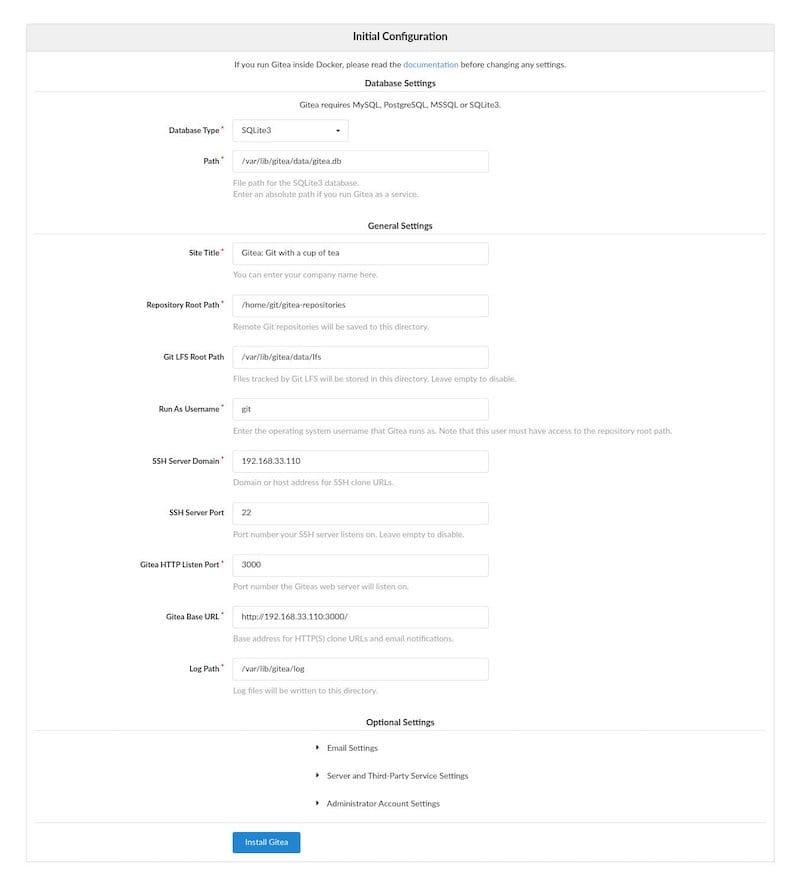How To Install Gitea on Rocky Linux 9

In this tutorial, we will show you how to install Gitea on Rocky Linux 9. For those of you who didn’t know, Gitea is a free and open-source Git repository hosting platform. It allows you to work with version control software with other features including issue tracking, pull requests, user management, notifications, and more. It is very similar to GitHub. Gitea is written in the Go language and can be installed on multiple operating systems, including Linux, macOS, Windows, and architectures like amd64, i386, ARM, and others.
This article assumes you have at least basic knowledge of Linux, know how to use the shell, and most importantly, you host your site on your own VPS. The installation is quite simple and assumes you are running in the root account, if not you may need to add ‘sudo‘ to the commands to get root privileges. I will show you the step-by-step installation of Gitea on Rocky Linux. 9.
Prerequisites
- A server running one of the following operating systems: Rocky Linux 9.
- It’s recommended that you use a fresh OS install to prevent any potential issues.
- SSH access to the server (or just open Terminal if you’re on a desktop).
- A
non-root sudo useror access to theroot user. We recommend acting as anon-root sudo user, however, as you can harm your system if you’re not careful when acting as the root.
Install Gitea on Rocky Linux 9
Step 1. The first step is to update your system to the latest version of the package list. To do so, run the following commands:
sudo dnf makecache --refresh sudo dnf install dnf-utils
Step 2. Install MariaDB Database.
By default, MariaDB is available on Rocky Linux 9 base repository. Now run the following command below to install the latest stable version of MariaDB to your system:
sudo dnf install mariadb-server mariadb
Once the installation is complete, start the MariaDB service and enable it to automatically start on boot by running the following command below:
sudo systemctl enable mariadb --now sudo systemctl start mariadb sudo systemctl status mariadb
To check the version of MariaDB installed, run the command below:
mariadb --version
By default, MariaDB is not hardened. You can secure MariaDB using the mysql_secure_installation script. you should read and below each step carefully which will set a root password, remove anonymous users, disallow remote root login, and remove the test database and access to secure MariaDB:
mysql_secure_installation
Configure it like this:
- Set root password? [Y/n] y - Remove anonymous users? [Y/n] y - Disallow root login remotely? [Y/n] y - Remove test database and access to it? [Y/n] y - Reload privilege tables now? [Y/n] y
Next, you will need to create a database and user for Gitea:
mysql -u root -p
Once you are logged in, create a database and user with the following command:
MariaDB [(none)]> CREATE DATABASE gitea CHARACTER SET 'utf8mb4' COLLATE 'utf8mb4_unicode_ci'; MariaDB [(none)]> GRANT ALL ON gitea.* TO 'gitea'@'localhost' IDENTIFIED BY 'your-strong-password'; MariaDB [(none)]> FLUSH PRIVILEGES; MariaDB [(none)]> EXIT;
For additional resources on installing MariaDB, read the post below:
Step 2. Installing Git.
By default, Git is available on Rocky Linux 9 base repository. Now run the following command below to install the stable version of Git to your system:
sudo dnf install git
You can verify the installed version by using the command below:
git --version
Next, add the user that will run the Git application:
adduser --system --shell /bin/bash --comment 'Git Version Control' --create-home --home /home/git git
For additional resources on installing Git, read the post below:
Step 3. Installing Gitea on Rocky Linux 9.
By default, Gitea is not available on the Rocky Linux 9 base repository. Simply download the latest version of the Gitea package by using the wget command:
wget -O /tmp/gitea https://dl.gitea.io/gitea/1.17.3/gitea-1.17.3-linux-amd64
Move the Gitea binary file to “/usr/local/bin“:
mv /tmp/gitea /usr/local/bin
Next, make the binary executable:
chmod +x /usr/local/bin/gitea
Now create the directory structure and set the required permissions and ownership:
mkdir -p /var/lib/gitea/{custom,data,indexers,public,log}
chown git: /var/lib/gitea/{data,indexers,log}
chmod 750 /var/lib/gitea/{data,indexers,log}
mkdir /etc/gitea
chown root:git /etc/gitea
chmod 770 /etc/gitea
To give the file permission using the following command:
restorecon -rv /usr/local/bin/gitea
Step 4. Create a Systemd Service File for Gitea.
We will need to create a systemd service file to manage the Gitea service:
wget https://raw.githubusercontent.com/go-gitea/gitea/master/contrib/systemd/gitea.service -P /etc/systemd/system/
Then, reload the systemd daemon with the following command:
sudo systemctl daemon-reload sudo systemctl enable --now gitea
Step 5. Configure Firewall.
Rocky Linux 9 comes with firewalld enabled by default, and it will block other connections from other computers that are trying to access our Gitea service. We must open the appropriate ports so that the Gitea resources can be accessed from other machines:
sudo firewall-cmd --permanent --zone=public --add-port=3000/tcp sudo firewall-cmd --reload
Step 6. Accessing Gitea Web Interface.
Once successfully installed, open your web browser and access the Gitea Web UI using the URL http://your-IP-address:3000. You will be redirected to the following page:

Congratulations! You have successfully installed Gitea. Thanks for using this tutorial for installing Gitea on your Rocky Linux 9 system. For additional help or useful information, we recommend you check the official Gitea website.